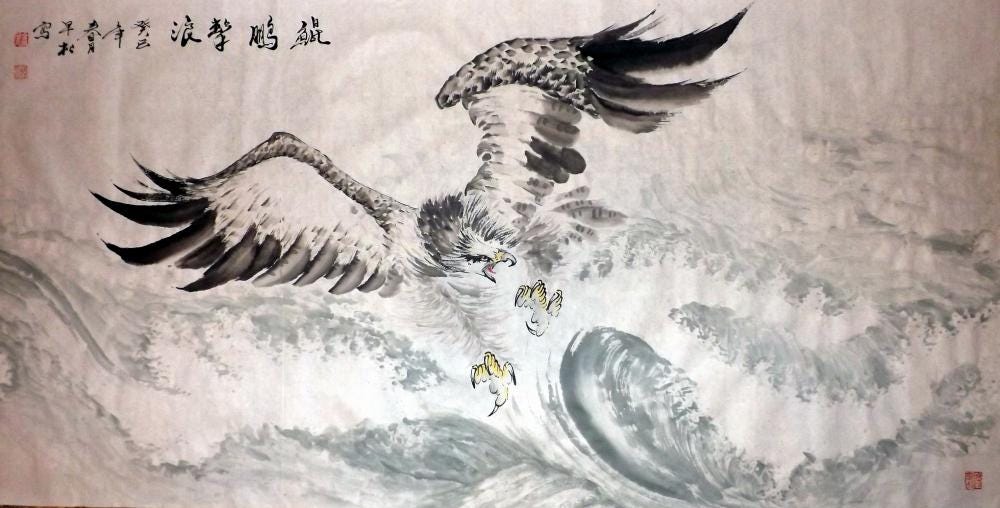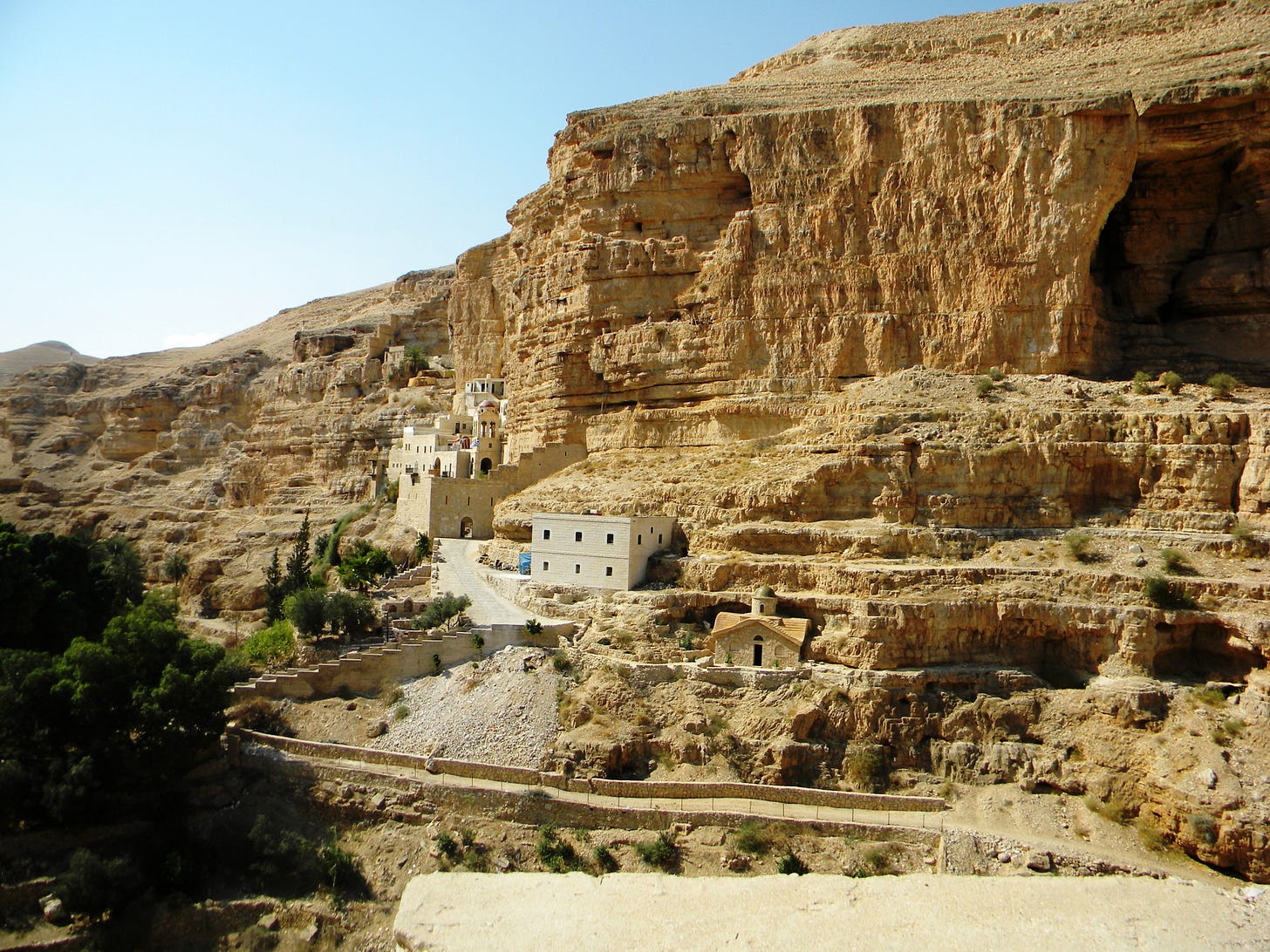北冥有魚,其名為鯤。鯤之大,不知其幾千里也。化而為鳥,其名為鵬。鵬之背,不知其幾千里也;怒而飛,其翼若垂天之雲。是鳥也,海運則將徙於南冥。南冥者,天池也。
In the Northern Ocean there is a fish, the name of which is Kun – I do not know how many li in size. It changes into a bird with the name of Peng, the back of which is (also) – I do not know how many li in extent. When this bird rouses itself and flies, its wings are like clouds all round the sky. When the sea is moved (so as to bear it along), it prepares to remove to the Southern Ocean. The Southern Ocean is the Pool of Heaven.
Zhuangzi 庄子, 1.1
The ideogram tian 天 is a highly important one in classical Chinese cosmology and mythology—and in modern Chinese, tian is a character with a gargantuan lexical range. On its own, or as the compound tiankong 天空, it simply refers to ‘the sky’, as in tian hei le 天黑了 ‘the sky’s gotten dark’, or qingtian 晴天 ‘clear sky’. It can also refer to a ‘day’, as in the compounds zuotian 昨天 ‘yesterday’, jintian 今天 ‘today’, mingtian 明天 ‘tomorrow’, houtian 后天 ‘the day after tomorrow’, or zhoutian 周天 ‘Sunday’: wo zai Fuzhou guole jitian 我在福州过了几天 ‘I spent a few days in Fuzhou’. It’s also used in compounds like baitian 白天 ‘daytime’, hangtian 航天 ‘spaceflight’, tiancai 天才 ‘genius’, tian’e 天鹅 ‘swan’, tianli 天理 ‘natural law’, tianqi 天气 ‘weather’, tianqiao 天桥 ‘footbridge’, tianran 天然 ‘natural’ and tiansheng 天生 ‘innate’.
In addition to all of these, Tian 天 carries the cosmological and religious connotations of ‘heaven’, ‘heavenly’ or ‘divine’. Tiantang 天堂 is the term used to denote the Abrahamic paradise. Tiantan 天坛 is the Temple of Heaven in Beijing. Tianshen 天神 refers to the god(s) of Heaven. To gao Tian 告天 is to pray to Heaven (either in supplication or in imprecation). The Chinese name for the Ka‘bah in Mecca is Tianfang 天房 (the ‘Heavenly House’), and the term that the Jesuits used for the Abrahamic God was Tianzhu 天主, or the ‘Lord of Heaven’.
In early Chinese antiquity (prior to 1046 BC), there appear to have been two somewhat disparate systems of religious belief. In the Central Plains (present-day Henan Province), the system of belief which predominated was one in which a god, Di 帝 (also called Shangdi 上帝) was worshipped. This Di was taken to be, if not the supreme god, then at least the god which was had the closest relationship to the ruling Yin 殷 family. Di was also, however, a rather arbitrary and capricious god, responsible for both natural blessings and natural disasters, military victories and military defeats.
There was a slightly different religious belief system that was predominant in the region of Xiqi 西岐 (the Wei River basin in present-day Gansu and Shǎnxi, also called Guanzhong 关中) in northwestern China. Although the people of Xiqi also believed in Di 帝, they believed him to be part of a complex of gods or the ruler of a godly realm. They equated him, in fact, with the sky-god Tian 天, a god with a keen interest in the good order of the state, the welfare of nature and the welfare of people. Tian was considered to desire people to behave with respect and reverence toward one another and toward sacred geographical features—especially mountains, woods, rivers and lakes.
When the Ji 姬 family of Xiqi rebelled against, overthrew and killed the last of the Yin family dynasts, Shang Zhou Wang 商纣王 (a particularly sadistic, luxury-loving, debauched, murderous tyrant—think Benjamin Netanyahu combined with Jeffrey Epstein), the younger brother of the new king Ji Fa 姬发, named Ji Dan 姬旦, came up with an ideological explanation for the Yin family’s failure. Their own god Di 帝, who was in fact an aspect of Tian 天, had turned against them on account of Shang Zhou Wang’s crimes. The Ji family’s belief in Tian allowed them to argue that a king could lose legitimacy and be rightfully overthrown if he overextended his borders, overexploited the woods and rivers under his care, and abused the people in pursuit of his own comfort and wealth. Ji Dan, later to be called Duke Wen of Zhou 周文公, was credited with establishing the notion of Tianming 天命, the ‘will of Tian’ or the ‘mandate of Tian’ which could be withdrawn from an unjust ruler.
The Zhou 周 Dynasty founded by the Ji family was the longest-reigning dynasty in Chinese history, nearly 800 years (1046 BC – 256 BC). All of the Chinese Classics were compiled or written during this time, and some of them were attributed to the founders of the dynasty. (Ji Dan, for example, was traditionally considered to be the author of the Book of Changes or Yijing 《已经》.) The founders of the various schools (zhuzi baijia 诸子百家) were active during the latter half of the Zhou Dynasty, though they had access to a common corpus of Scriptures which were considered authoritative among the majority of them. Both the followers of Confucius 孔子 and Laozi 老子 revered the Book of Changes, for example, and included it in their respective canons.
For a highly-fictionalised and mythologised treatment of the Yin-Zhou dynastic transition, I could recommend watching the recent Chinese epic film 《风神第一步》 Creation of the Gods I: Kingdom of Storms. It’s a bit like if someone in the West made a film about the fall of Rome in the style of Lord of the Rings.
Chinese thought has historically been flexible enough that Tian 天 was considered to be both a divine person with a will, and also a natural principle or force. Even within a particular school of Classics studies, Tian could be considered a ‘person’ or a ‘principle’. Xunzi 荀子, for example, famously considered that Tian was a constant and unchanging principle comparable to nature; and although human beings must be in harmony with Tian, Tian itself was very much so not-human. On the other hand Xunzi’s fellow-disciple of Confucius, Dong Zhongshu 董仲舒, held forth in his commentary on the Spring and Autumn Annals that Tian had was capable of thinking and willing in ways comparable to a human being.
Strictly from a lexicographical perspective, I tend to think Dong Zhongshu’s position has more merit. The earliest occurrences of the character tian 天, both from oracle-bones and from inscriptions in cast bronzes, clearly show a human-shaped figure with a definite head, a definite torso, two arms and two legs. This data may be interpreted such that the early Zhou thought of their god as having human features.
Another interpretation is that the word tian 天 refers to the top of the head; the head being the most exaggerated feature of the human figure in the original ideogram. This is supported by certain ancient lexicons, such as Xu Shen’s 许慎 Shuowen jiezi 《说文解字》, linking tian 天 to dian 颠 ‘the crown’, ‘the top of the head’; and also to dian 巅 ‘summit’, ‘(mountain) peak’. Unfortunately, Xu Shen’s methods are a tad faulty, as he doesn’t take into account pre-seal script forms. And modern scholars’ attempts to euhemerise Tian 天 with this etymology strike me as… well, ad hoc.
Why do I say so? Well, the earliest lexical functionalities of tian 天 in the most ancient complete texts argue against such a reading. For example, the Book of Odes:
出自北門、憂心殷殷。
終窶且貧、莫知我艱。
已焉哉、天實為之、謂之何哉。I go out at the north gate,
With my heart full of sorrow.
Straitened am I and poor,
And no one takes knowledge of my distress.
So it is!
Heaven has done it; -
What then shall I say?
Book of Odes 《诗经》, Odes of Bei 邶风, ‘North Gate’ 北门 lines 1-3
Or here:
汎彼柏舟、在彼中河。
髧彼兩髦、實維我儀。
之死矢靡它。
母也天只、不諒人只。It floats about, that boat of cypress wood,
There in the middle of the He.
With his two tufts of hair falling over his forehead,
He was my mate;
And I swear that till death I will have no other.
O mother, O Heaven,
Why will you not understand me?
Book of Odes 《诗经》, Odes of Yong 鄘风, ‘Cypress Raft’ 柏舟 lines 1-4
It makes little sense in these Odes (the most ancient complete Sinitic texts we have apart from the aforementioned oracle-bone and bronze inscriptions) to read the character tian 天 as serving the lexical function of ‘the top of the head’, or ‘the crown’, or ‘mountain peak’, or even ‘the sky’. It’s hard to think of a body part or a mountain peak being able to wei 为 ‘do, enact, make, bring about’ a disgraced official’s misfortune, or to liang 谅 ‘believe, sympathise, forgive’ a young girl’s choice of boyfriend… unless we attribute to it some kind of intentionality. Thus, it stands to reason from the lexical function of Tian 天 in these verses, even if it refers to a mountain peak or to the sky, is nevertheless being invoked as a god.
One actually sees this anthropomorphisation and deification of Tian 天 fairly consistently throughout Chinese history. In Daoism and in Chinese folk religion, Heaven came to be personified as Yuanshi Tianzun 元始天尊. (I will discuss the lexicography of the character zun 尊 here very soon, I promise!) Even today, the modern-day Chinese equivalent of ‘Oh my God!’ is (wo de) Tian a (我的)天啊 ‘(My) Heavens!’ or Tian ye 天爷 ‘Grandfather Heaven’ or lao Tian ye 老天爷 ‘Old Man Heaven’.
Even so, it is worth keeping in mind Xu Shen’s connexions of tian 天 to dian 颠 or 巅, because despite his only looking at relatively more recent character variants, these might give hints to the original pronunciation. Because the lexeme tian first appeared in Xiqi, in the Chinese Northwest, that geographical origin might also give us some hints about its origins.
There has been advanced a connexion, for example, between the Tian 天 of the northwestern Guanzhong Chinese, and the Tanrı تانغر (or Tengri ᠲᠩᠷᠢ)—the Eternal Blue Sky—of the neighbouring Turkic and Mongolic tribes. However, this is speculative. Given that it may have been initially pronounced with an /l/ or a /l̥/ rather than a /t/, certain hypothetical links have been advanced also between Tian 天 and a post-Classical Xiongnu word for ‘sky’ transcribed in Chinese as helian 赫连, which later became a Sinicised Xiongnu surname. This last hypothesis is particularly tantalising, because it suggests a possible Classical link between the Tian 天 of Xiqi and the Semitic roots ‘-l-h ע-ל-ה and ‘-l-’ ע-ל-א.
The modern Arabic word for the physical sky is samā’ سماء, corresponding to the Hebrew šāmayim שמים of Gen 1:1. But ‘Heaven’ in the Qur’anic, religious sense, is ‘Illiyyūn عليون—literally, ‘the summit’—which is also an epithet ‘the Most High’ for Allāh. This latter term derives from the two aforementioned Semitic roots, which (similar to the Chinese dian 巅 in particular) connote ‘height’ or ‘elevation’. For example: ‘aliyy علي is the basic word in Arabic for ‘high’ or ‘tall’ (and it also happens to serve as the personal name ‘Ali); the synonym ‘ālin عال is of course of the same derivation.
The superlative ‘Illiyyūn is cognate to the Hebrew ‘Elyón עליון, which appears as the epithet of the Lord (יהוה) in 2 Samuel 22:14:
ירעם מן-שמים יהוה ועליון יתן קולו:
The Lord thundered from heaven, and the Most High uttered His voice.
What is interesting about this passage from 2 Samuel, is that in the Psalmic repetitive construction being used here, ‘Elyón עליון ‘the Most High’ serves as a lexical pairing for both ‘the Lord’ and ‘heaven’ (šāmayim שמים). If we must live with certain ambiguities in post-Classical Chinese for the functionality of Tian 天, then it appears the same ambiguities must apply to the title ‘Elyón עליון! And if Tian is indeed meant by the Ji family and the inhabitants of Xiqi as an epithet or as a synonym for the Yins’ supreme god Di 帝, then the analogy to the Hebrew and Qur’anic names of ’Elohim / Allāh becomes that much stronger.














